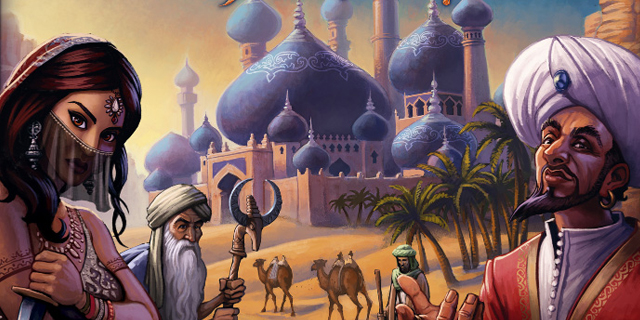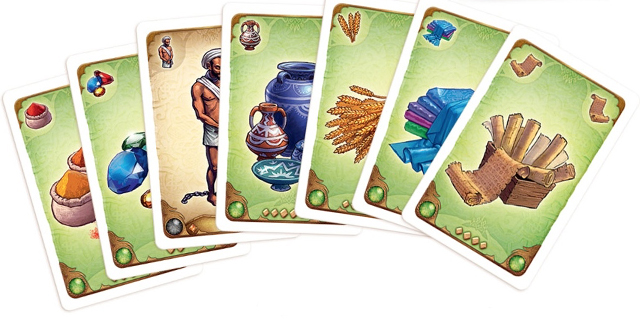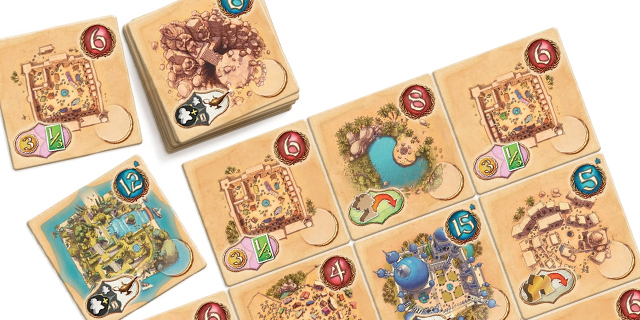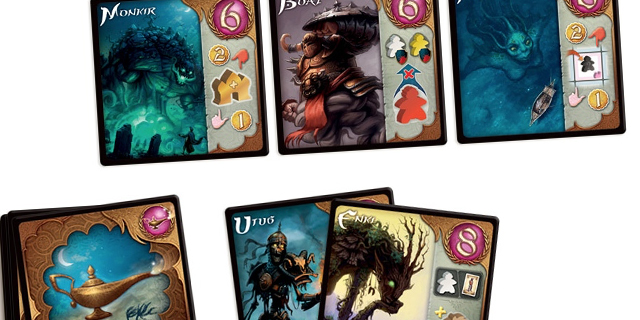
When you first sit down to a game of Five Tribes, it’s easy to feel overwhelmed. A grid of 30 tiles, representing five different types of district in the sultanate, each begin with three randomly-assigned colored meeples, representing the titular five tribes. A market of cards representing various goods are laid out to one side, and a selection of djinn on the other. Your mission is to maneuver the meeples to specific tiles to best take advantage of both the tribes and the tiles. Sounds simple, and it is, but it sure doesn’t seem that way when starting out.
On your turn, you have to pick up all of the meeples from a tile of your choice and then redistribute them to adjacent tiles, Mancala-style. The catch is that the tile you end on must already contain at least one meeple of the same color as the one you place there, so not every tile in range is necessarily a legal move. That final meeple will also determine the tribe benefit you receive that turn, so it’s best to pick the tile you want and then find a good starting point.
Once you have finished moving, remove all meeples of the same color as your final one from the tile. If this empties the tile, place one of your camels on it to represent your ownership of it. You will earn its points at the end of the game. The number of meeples you picked up then affect your tribal ability for the turn. Yellow viziers and white elders are simply saved for endgame points, although elders have another use I’ll get to later. Green merchants allow you to collect cards from the market equal to the number of meeples removed. Blue builders earn gold based on the number of surrounding blue districts multiplied by the number of meeples taken. Finally, the red assassins allow you to remove a meeple from any tile within a range equal to the number of assassins removed; if this is the last meeple on that tile, you claim it as yours as if you ended your move there! Assassins can alternately remove a vizier or elder from an opponent if you wish.

The tile you stopped on will also provide a benefit, whether you claimed it or not. Markets allow you to spend gold to pick up a selection of goods, while Villages and Oases place palaces and palm trees on themselves (respectively) that will provide additional endgame points for that tile’s owner. Finally, Sacred Places offer you the chance to trade in accumulated elders to claim a djinn of your choice from the line-up. Djinn have various abilities that can aid you, but many demand payment in the form of elders.
The last phase of your turn is the option to turn in accumulated goods for gold. This is rarely used, but sometimes you find yourself short on cash and need an emergency influx before the end of the game, and this is one of the only ways to get it outside of the builders’ bonus or some djinn abilities. Bear in mind that some goods are more rare than others (helpfully indicated on the cards themselves), which is important when assembling large sets of unique items for the really big rewards.
Why would you need gold? Well, beside the cost to use the Market tiles, each round begins with a bidding for turn order. The more you spend, the earlier you act. This can be important if there is a move you really need to take, but it can also be costly. Up to three players (of the game’s current maximum of four) can actually bid zero, although this too has a potential cost as anyone who bids zero after you actually pushes you back in line. This strategic dance is fascinating as you must balance your desire to act early with the possibility that your planned move might be gone by the time you actually get to take it. Further complicating matters? Gold is also points! If you spend too much to go earlier, you might be losing whatever lead you hoped to gain through your action!

The game ends either when one player has placed their last camel or there are no legal moves available. In the very late stages of the game, it is actually possible to force players to take specific moves by judicious redistribution of meeples, which can make bidding for turn order even more impactful. Just about everything you have is worth points: owned tiles (plus palm trees/palaces on them), controlled djinns, unique sets of goods, leftover elders, collected viziers and remaining gold in hand. The viziers also provide a substantial bonus for having the most of them, awarding ten additional points for each other player you beat in that total, although this also applies to anyone in second (and third) place. There are no tiebreakers, but with so many paths to points the chance of two players scoring identically is pretty low.
Five Tribes is a brilliant game with deep strategy. It is a somewhat unusual offering from Days of Wonder, better known for lighter fare like Ticket to Ride or Small World. The blurb on the back of the box even highlights this fact, amusingly. But once you get over the initial overwhelming feeling of analysis paralysis, you quickly fall into a groove and the game proceeds smoothly. It can still be tricky to find your optimal move, as the board changes with every player’s turn, but so far it hasn’t been an issue with my group. Occasional thinking delays (and set-up time) aside, a game usually takes about an hour to complete.

If there is a flaw to Five Tribes, it would have to be the design choice to include slave cards in the market. Slaves are actually the most common card in the market deck, but unlike the goods, they are worth nothing on their own and cannot be sold. They can, however, be spent to enhance the effect of the builders, extend the range of the assassins, or in lieu of an elder when purchasing or powering djinn. These cards could have been almost anything else and still served their function without invoking unpleasant feelings among some players. It’s an issue that many historical games have to face, but Five Tribes didn’t necessarily need to thanks to its fictional setting. This is unfortunate, as the game really is quite good, but has this specter hanging over it like a cloud. I still recommend Five Tribes, but be aware that this could be an issue with your group.
Five Tribes retails for $60.



















